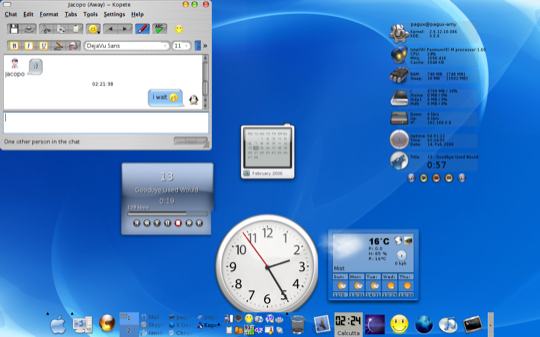
Purdy!
You know who you are: the guy who doesn’t do Linux. Windows works fine, all of your software works under Windows, and things are much cooler when you don’t have to worry about all that command-line garbage. Sure, Vista is a dog and SP1 causes cancer. Sure gaming is getting hit or miss without enough hardware to launch a space mission. Windows works for business and pleasure. I’m here to convince you otherwise, if I can.
When I write, I like to imagine a potential reader. This potential reader is a buddy of mine who works in web development and has focused on Windows/ASP/.NET for the past four years, never looking around to watch the world of LAMP blossom around him. This, then, is for him.
Linux is easy
Command line interfaces are hard, right? XP has a great GUI and you so rarely have to use MS-DOS that there’s no reason to learn all those fancy commands. Well, there are some things you can do in the command line so quickly that it boggles the mind. Want to resize a bunch of images? Fix your mailbox? Scan through your files? Command-line tools are your best bet. Want to tweak network and OS configurations? Watch for intruders? Figure out why a GUI program isn’t working? Command lines are perfect for these purposes. If you’re a power user — or call yourself a power user — not using command line tools is like calling yourself a pirate and never sailing the seven seas.
Then, take a look at some modern Linux GUIs. This is some serious stuff. Many complain that Linux steals ideas from other operating systems, which is fair, but I’d rather have a bunch of budding programmers work on a copy of OS X than a copy of Windows Vista.
Linux is feature-rich
Linux is a fully-featured OS for desktops and for developers. The OS comes out of the box with text editors, SDKs, games, cool UIs, theme-able desktops, widgets, and support for most major codecs. It even has a few office suites. What can’t you really run? A lot of proprietary stuff like iTunes and Quicken, but you’re a geek, right? You’ll figure out a way to get around those problems.
Linux is secure
Like OS X, Linux viruses are few and far between and security is all but baked into applications. If you’re programming for the web, Linux is your best bet. See point 4.
Linux is fun
Linux is fun to learn. It’s a challenge and amazingly easy and ugly and beautiful at the same time. Linux is like turning on your first computer and figuring out what all those weird boxes did. Once you figure out all the secrets, I’d say Linux offers a greater power-user satisfaction than XP, as a whole. Exploring Linux is fun. Exploring XP is a dummies book.
Linux runs the Internet
If you’re a web consultant and you don’t know Linux, you’re a moron. As pretty as .NET is, it’sLAMP(Linux/Apache/MySQL/PHP|Perl)’s world and Ruby lives in it. We’re just visiting PHP is as simple as Visual Basic used to be and amazingly powerful. With a little effort, a quick prototype backend can be coded overnight and a final product in a few days. You could run your web apps on Windows, but then you’d face hordes of bots attacking your server and a sense that something is amiss. Don’t do it.
Linux makes you money
As a former consultant, learning LAMP was the best thing I could have ever done. The software is free, you can amaze your clients with cool programs, and you don’t have to convince them to buy a huge server or invest in an OS just to run a stupid little web site. Sure, you can get virtual hosting somewhere on an NT box, but you can get a LAMP box cheaper and more readily and, thanks to command line tools, you can tweak the setup in seconds rather than digging through menus.
In short, Linux makes good personal and business sense. Granted, I use OSX as my daily OS, but I run all of my websites remotely using the shell and faith. Linux — and open source — work and work well.